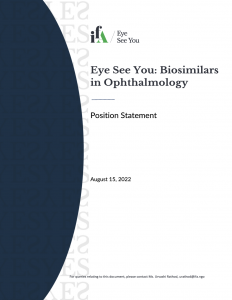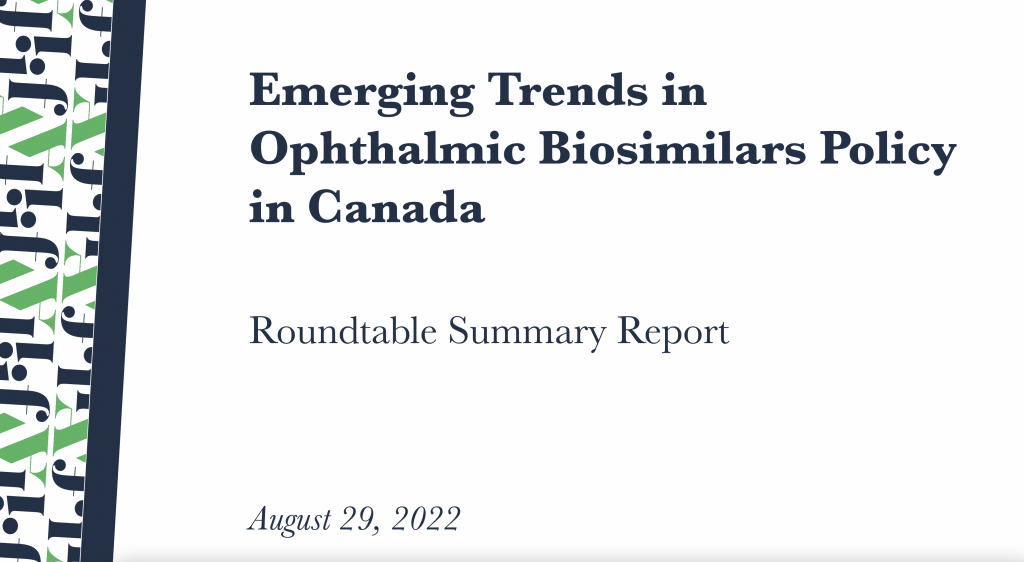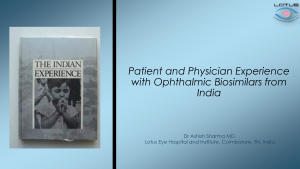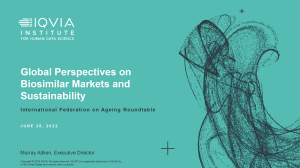Eye See You Position Statement
Background
Biologics are a class of medications produced by living cells using recombinant DNA technology and are used to treat conditions in rheumatology, oncology, gastroenterology, ophthalmology, and other areas of medicine. i At the same time that patents expire on originator biologic drugs, biosimilars engineered to be similar to the reference products are entering markets as a less costly and less time-consuming alternative to manufacture. ii Consequently, there is a growing movement towards the use of biosimilars globally, but policy to inform their introduction is generally lagging.
World Sight Day – October 2022
On World Sight Day, Canadians are being called to recognize the risk of mandatory switching that may limit their eye care

In advance of World Sight Day on October 13th, the International Federation on Ageing in partnership with national and global organizations wants to drive action for eye care, to improve the situation for those impacted by vision loss and blindness, now, and in the future. While global agencies support initiatives to improve, restore, and maintain vision for people around the world, many Canadians need to prepare for policy changes about their eye treatment that have the potential to impact patient and physician autonomy.
In alignment with the IFA’s position statement, the Canadian Ophthalmological Society (COS) published guidance on the use of biosimilars in the ophthalmic setting, reinforcing the need at all times for the physician to determine the most appropriate management and treatment plan. The COS statement highlights that “the physician-patient relationship and a patient’s resulting confidence in their treatment plan are crucial to successful treatment. Limiting choice and mandating changes to existing successful treatment regimens undermines that confidence and could be detrimental to patient care .”
The Canadian Patient Group Community Provides Perspective
“We’ve seen the impact of policies that favour cost savings over patient care, it has a cascading effect detrimental to the person and their overall health and wellbeing. Loss of vision has been linked to loneliness, social isolation, and feelings of worry, anxiety, and fear,” says Dr. Jane Barratt, Secretary General, IFA.
“The Canadian Council of the Blind (CCB) believes that those of the 1.2 million Canadians living with vision loss who are currently being treated with biological medications, as well as those that will be treated in the future, should have the option of being treated with the best possible medication for their condition. Decisions on which medication is most appropriate should be based on their ocular condition alone and not on cost,” describes Jim Tokos, National President of the CCB.
“Short-sighted policies aimed to save costs put patients at risk,” explains Gail Attara, President and Chief Executive Officer of the Gastrointestinal Society. “We have witnessed how switching medications in other health areas to so-called cheaper ones actually resulted in increased expenditures in other areas of health in British Columbia, i.e., more physician visits, more lab testing, and treatment in the emergency room, which negatively affected the health of more than 25% of patients.”
“The Alliance for Safe Biologic Medicines (ASBM) supports the introduction of biosimilars as an important tool for offering patients new therapeutic options and reducing healthcare costs. The tremendous success of biosimilars in European markets has shown that countries need not sacrifice physician and patient’s choice to enjoy substantial savings. This is accomplished through competition between many reimbursed products, rather than forced switches. Physicians and patients in Canada deserve no less – yet they are increasingly seeing their choice restricted rather than expanded. With the arrival of ophthalmic biosimilars, we must heed the concerns of these physicians and their patients regarding unnecessary switching, so that we do not risk long-term harm to patients for short-term savings” states Michael Reilly, Executive Director, ASBM.
There is no doubt that efficiencies in our health system are required, and the IFA recognizes and supports important measures that will identify cost savings in one area so that resourcing can be reallocated benefiting more patients. As organizations advocating for vision health, we remain concerned about policies mandating the use of medications which appear to be largely based on the cost that may limit and restrict a physician from treating their patient with the most appropriate medicine, based on their expertise. “We have trust in our doctors who take an oath to protect a patient’s health, then why would we restrict their ability to do their job properly? While biosimilars provide greater options for the patient, non-medical mandatory switching of ophthalmic medications may negatively impact patients whose vision while using the original drug is stable,” says Dr. Barratt.
Insufficient data on ‘non-medical switching’ remains a point of contention, according to policies that have already been enacted in other provinces, such as Alberta and British Columbia. We are in agreement with the COS and American Academy of Ophthalmology (AAO) that call for more data, “given the unique immunological environment and limited tolerance for inflammation which exists with direct administration of the medication into the eye.” The COS also “cautions against mandating large scale, automatic shifts from the reference to biosimilar medications until sufficient human experience has been accumulated to ensure confidence in safety.”
The IFA, in partnership with national and global organizations as advocates for options in eye health, wants Canadians to recognize the potential risks involved in mandatory switching to biosimilars, and how they can ensure their health rights are not restricted. Patient and physician’s choice need to be respected and, while a focus on health system efficiencies is important, it should not be employed at the cost of a Canadian’s eyesight.
Social Media Kit
The IFA has created the following Social Media kit to help organizations for older adults share impactful information to their members.
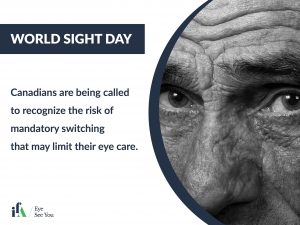 Post:
Post:
Maintaining and improving the vision of Canadians through appropriate therapeutic interventions is a good return on investment for society across all ages, and to mark this World Sight Day, IFA is proud to contribute to focusing attention on the national issue of eye health. Learn more: bit.ly/3So7JWW #IFA #vision #health #biosimilars
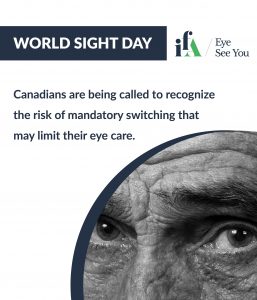 Post:
Post:
Maintaining and improving the vision of Canadians through appropriate therapeutic interventions is a good return on investment for society across all ages, and to mark this World Sight Day, IFA is proud to contribute to focusing attention on the national issue of eye health. Visit bit.ly/3So7JWW
 Post:
Post:
Maintaining and improving the vision of Canadians through appropriate therapeutic interventions is a good return on investment for society across all ages, and to mark this World Sight Day, IFA is proud to contribute to focusing attention on the national issue of eye health. Learn more: bit.ly/3So7JWW #IFA #vision #health #biosimilars
Emerging Trends in Ophthalmic Biosimilars Policy in Canada – 2022 Roundtable

Over 2 million Canadians are currently living with vision loss as a result of retinal diseases. The current most advanced treatments available for eye conditions include biologic anti-VEGF treatment as a way to slow vision loss in people with wet age-related macular degeneration (wAMD) or diabetic retinopathy (DR). However, with patents on the anti-VEGF biologics soon to expire, there is an emerging trend toward the use of biosimilars in ophthalmic practice. Government policies in India, Europe, and the United States of America (USA) to procure and implement biosimilars are not only about the safety and efficacy of the regimen, but also the potential cost-savings.
In Canada, various federal and provincial consultations have informed the broad landscape of biosimilars policies, yet sparse attention has been given to specific fields such as ophthalmology. Awareness and education of biosimilars (rather than the originator) as a treatment option is an important step towards the development of policies that support safe and effective management and treatment, specific to the needs of patients and their medical conditions.
The Findings
To position this emerging field in a Canadian context with a focus on awareness and education of physician and patients, and the barriers of implementing biosimilar policies globally, the International Federation on Ageing (IFA) convened a virtual roundtable discussion on ‘Emerging Trends in Ophthalmic Biosimilars Policy in Canada’. Leaders of civil society and patient advocacy groups, alongside retinal specialists and public policy experts shared perspectives in this forum on biosimilar policies and practice with respect to the changing vision health landscape in Canada.
The meeting unpacked details related to physician and patient experiences and the level of awareness of biosimilars, along with the challenges and successes of implementing biosimilars policies globally, and the potential impact of mandatory non-medical switching to biosimilars policies on patients in Canada.
[ms_youtube link="https://www.youtube.com/watch?v=WM1YBZFC11U" width="100%" height="100%" mute="no" autoplay="no" loop="no" controls="yes" class="" id=""][/ms_youtube]
Emerging Trends in Ophthalmic Biosimilars Policy in Canada - 2022 Roundtable
This roundtable is supported by the generous unrestricted educational sponsorship from Biogen
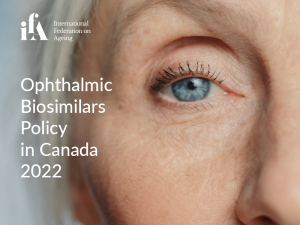 Post:
Post:
#Governments must develop policies that move the biosimilar discussion beyond an economic savings model toward the health and well-being of patients. This begins with interdisciplinary and multi-sectoral collaboration and targeted advocacy efforts. https://bit.ly/3L9E9m5 #ifa #vision #health #biosimilars
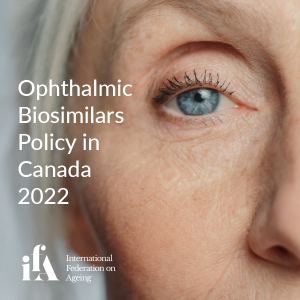 Post:
Post:
#Governments must develop policies that move the biosimilar discussion beyond an economic savings model toward the health and well-being of patients. This begins with interdisciplinary and multi-sectoral collaboration and targeted advocacy efforts. https://bit.ly/3L9E9m5 #ifa #vision #health #biosimilars
 Post:
Post:
#Governments must develop policies that move the biosimilar discussion beyond an economic savings model toward the health and well-being of patients. This begins with interdisciplinary and multi-sectoral collaboration and targeted advocacy efforts. https://bit.ly/3L9E9m5 #ifa #vision #health #biosimilars

